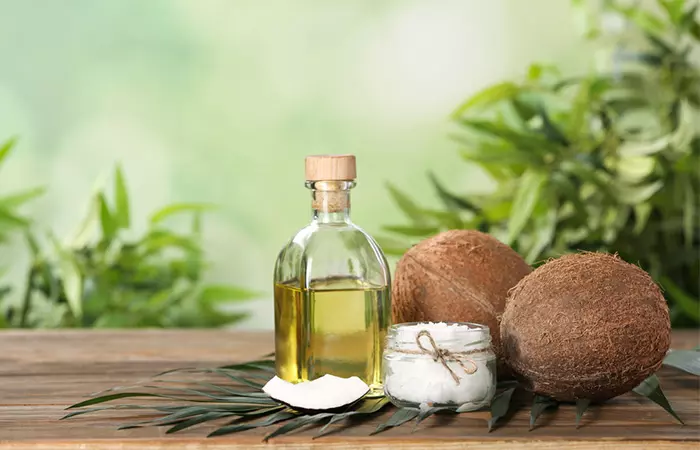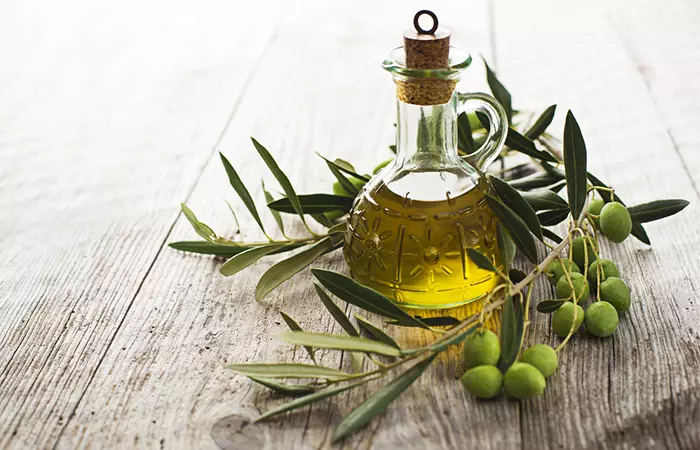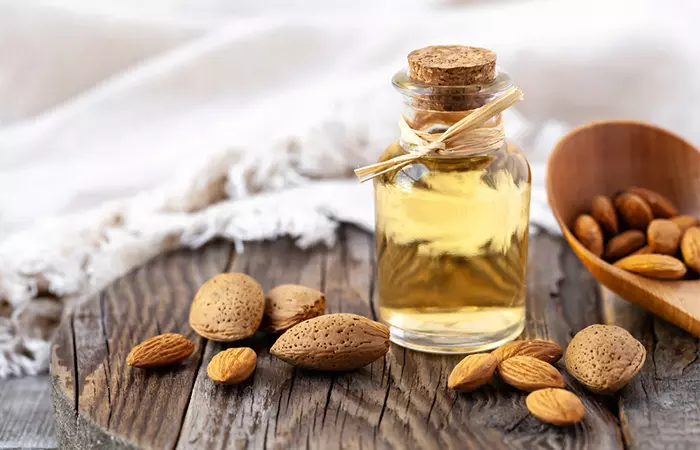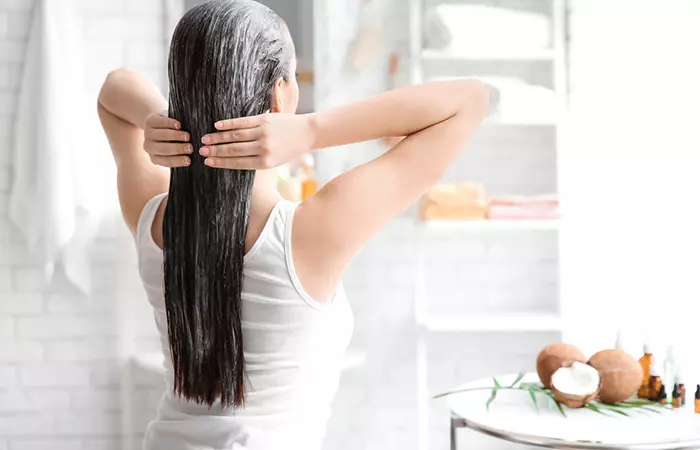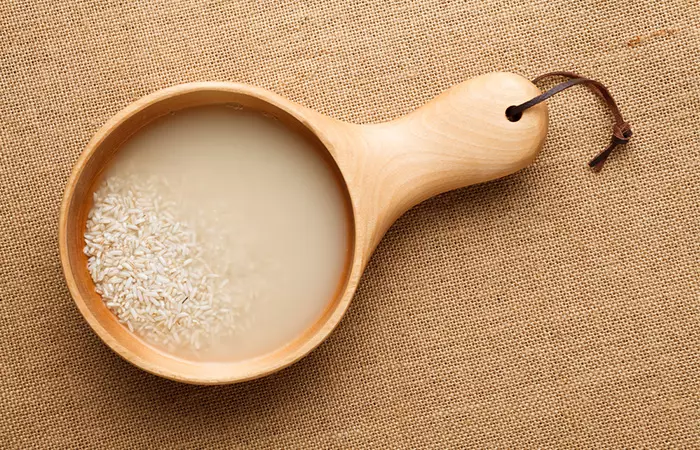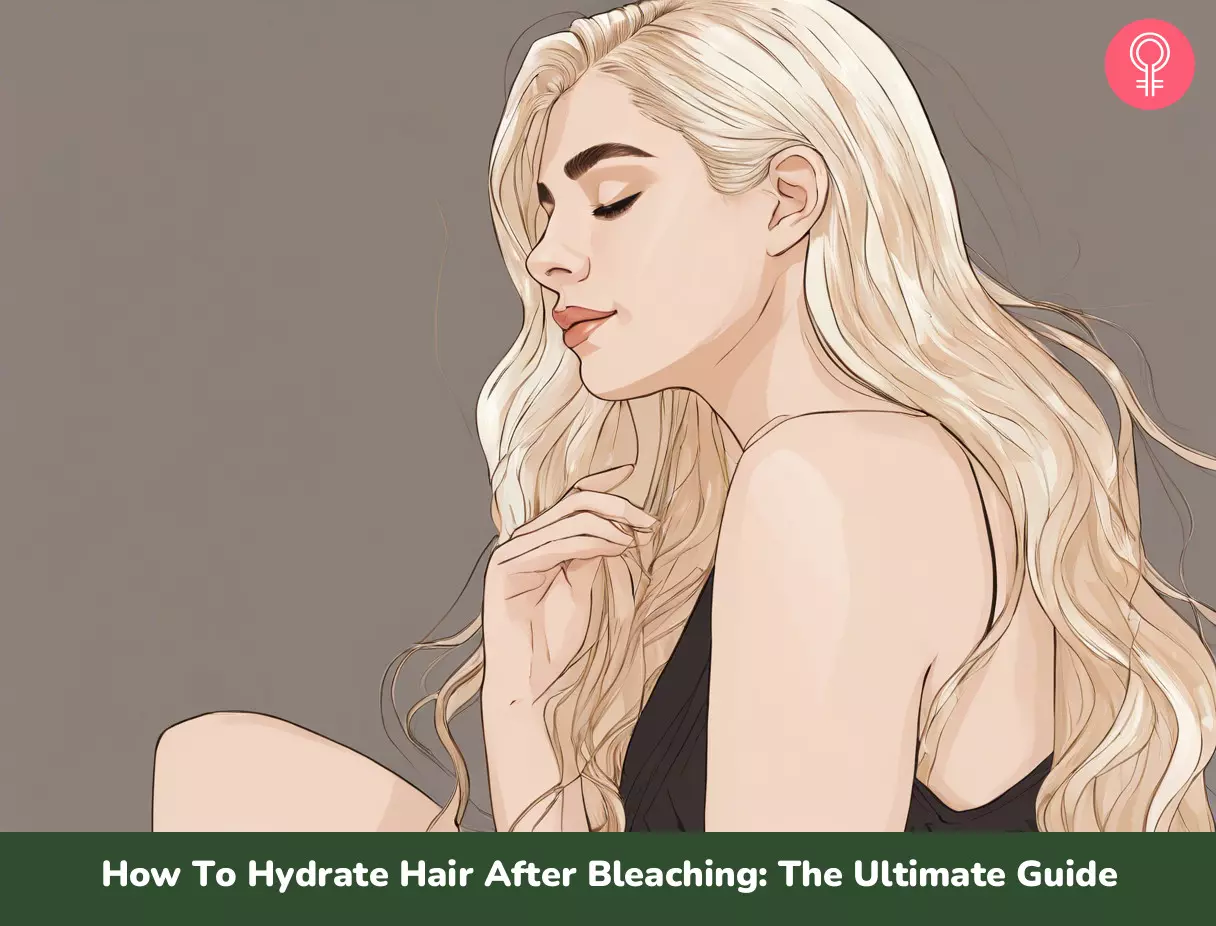What Does Bleach Do To The Hair?
Bleaching agents can damage the hair in the following ways:
They make the hair dry and lifeless and cause protein and cysteine loss in hair fibers (1), (2). They reduce the hair’s brightness, softness, and manageability (3). The chemicals like ammonium hydroxide and hydrogen peroxide in bleaching products open up the hair fibers, causing inter-fiber friction (4). Bleaching also damages the hair cell membrane complex and endocuticle (inner layer of the cuticle) (4). Bleaching weakens the bonds in the hair, affecting its structural integrity (5). This makes your hair prone to further damage during combing and similar grooming processes. It also increases hair porosity.
A blogger talked about her personal experience of bleaching hair and how it affected her strands. She recounts, “I don’t think I realized how horribly damaged my hair was until later that day when I was washing out the conditioner (i).” She further shares, “There were large chunks of my hair that had broken off two inches from the scalp.” If you have recently bleached your hair, there is no need to panic. There are ways you can repair the damage. Scroll down to know more.
Tips To Hydrate And Repair Hair After Bleaching
It’s crucial to prepare your hair for bleaching before and after undergoing the process. Below are some tips on how to take care of your hair after completing the bleaching process.
Coconut Oil: Coconut oil penetrates the hair fibers and fortifies the hair from within. It also protects the hair from UV damage (6). A study showed that coconut oil could reduce protein loss in bleached hair. Using coconut oil as a pre-wash regimen before bleaching can reduce inter-fiber swelling (7). Moreover, coconut oil acts as a protein shield, reduces hair loss, and promotes hair growth (8).
Argan Oil: Argan oil can reduce protein loss by minimizing cuticle swelling and chipping (3). It also prevents hair loss and reduces dryness as it is rich in tocopherols, squalene, and oleic acidi An anti-inflammatory monounsaturated acid that lowers cholesterol and prevents heart disease. and has antioxidant properties (9), (10). Argan oil can also help treat skin and scalp issues like eczemai A chronic and autoimmune disorder that results in dry, itchy, and swollen skin during flare-ups. and psoriasisi An autoimmune disease that causes the buildup of skin cells, leading to scaly patches and inflamed rashes on the scalp, knees and elbows. .
Olive Oil: Olive oil contains monounsaturated fatty acidsi A type of healthy fat found in plant foods like avocados, nuts and vegetable oils that helps improve blood cholesterol levels. , tocopherols, carotenoidsi A group of naturally occurring pigments that give many plants their yellow, orange, and red hues. , and squalene and has antioxidant properties that can hydrate the hair and prevent damage (11). It also decreases hair breakage and improves shine. A study also found that consuming olive oil might prevent hair loss by inhibiting 5-alpha reductase, an enzyme that produces DHT, an androgen causing hair loss (12) (13).
Almond Oil: Almond oil is rich in oleic and linoleic acid and is an excellent hair tonic and lotion (14). Traditionally, almond extracts have shown to promote hair growth and have anti-inflammatory properties that may soothe an irritated scalp (15).
Jojoba Oil: Jojoba oil is a natural wax ester that is similar to sebum. It is often used to nourish dry scalps. Jojoba oil helps unclog pores, remove excess sebum from the scalp, and restore hair health. It has anti-inflammatory properties that can soothe scalp inflammation in cases of eczemai A chronic disease that causes inflammation, itchiness and rashes on the scalp and skin, thereby weakening the skin barrier and is common among young children. , psoriasis, and dandruff. Avocado: Avocado is one of the best natural conditioners for dry and damaged hair. It contains omega-3 fatty acids and essential amino acids that coat the hair fibers to seal in moisture and improve texture. Avocado is rich in biotin that can stimulate hair growth. Yogurt: Yogurt is another moisturizing and protecting natural hair care ingredient. It contains probiotic bacteria that improve hair density and extend the anagen phasei The active phase of the hair growth cycle that lasts about 3-6 years, where the hair strands increase in length by about one centimeter. . Yogurt also improves scalp health, reduces hair damage, regulates sebum production, and maintains the scalp pH.
Rosemary Oil: A study showed that rosemary oil could reduce dandruff (25). This oil can also help stimulate hair growth and unclog pores (26), (27). It has anti-inflammatory properties that can help soothe inflamed and irritated scalp and improve alopeciai A common autoimmune disease that causes patchy hair loss from the scalp, face and other areas due to the immune system attacking the hair follicles. . Onion Juice: Onion juice helps improve hair growth in people with alopecia (28). It enhances hair appearance and also prevents hair loss and scabies (14). Peppermint Oil: A study showed that peppermint oil could stimulate hair growth without any adverse reactions (29). It has antibacterial, antiseptic, and antifungal properties that protect, cleanse, and soothe the scalp. Witch Hazel: Witch hazel can be used to treat a sensitive, inflamed, or burned scalp (30). It contains tocopherols that have high antioxidant properties (31). It also has anti-inflammatory and antiviral properties and prevents hair color oxidation.
Use Custom Blends: Opt for sulfate-free shampoos and conditioners that you can customize to suit your hair care needs. Brands like SkinKraft develop customized hair care products catering to your needs. Hair bleaching can cause dryness and hair fall. Choosing products that answer all your hair needs without stripping the hair or worsening the damage is crucial for recovery. Pre-Bleaching Care: Pre-wash your hair with coconut oil before bleaching. This prevents inter-fiber friction and protein loss. You can also check with a professional stylist for the right hair care products for pre-bleach hair care. These products contain ingredients that coat the hair and prevent severe damage. Choose The Right Products: If you frequently bleach and color your hair, use hair care products specially developed for color-treated hair. You can find umpteen products that treat bleached hair and prevent it from losing its texture and softness. Trim Hair Regularly: While this step might not seem important, it is a very beneficial hair care tip. Bleaching your hair will leave the ends dry and lifeless. Trimming your hair gets rid of split ends.
These tips can help mitigate some damage and help deeply replenish dry hair, leaving it soft and luscious. However, apart from adopting these above-stated hair care habits, it’s also important to consider some dietary and lifestyle changes to fix your dry hair and help your tresses get the moisture they need. Learn more below.
Lifestyle Adjustments For Hair Recovery Post-Bleaching
Bleaching can be a traumatic experience for your hair. It can leave hair looking dry and lifeless. Hence, it’s important to look for ways and means to restore moisture back into your mane and keep it looking healthy. Ahead, we list down certain lifestyle changes that can help you to get healthy, shiny hair.
Drink Ample Water
Drink at least 8 glasses of water a day to hydrate your body from the inside out. Drinking water can keep your strands moisturized and give it a healthy appearance.
Use Cool Water For Last Rinse
Wash off your conditioner with cool water to lock in the moisture of your hair and boost the mane’s shine.
Alter Your Diet
Consume a diet rich in omega-3 fatty acids, protein, vitamin b12, and iron to repair hair damage and improve hair growth (32).
Sleep On Silk Pillowcases
Sleep on silk pillowcases or hair scarves as they are gentle on hair, do not cause friction or suck the moisture out of them.
Go For Balayage
Opt for balayage highlights rather than going for a full-hair color. Balayage highlights are gentle on your hair and are a lot easier to maintain. How long does hair take to recover from bleach? It may take a month for your hair to completely recover from the effects of bleaching. It’s all about how you look after your bleached hair, from deep conditioning treatments to using the right hair care products that help replenish moisture and restore strength. Does bleached hair need protein or moisture? It needs both. Bleaching agents penetrate your hair strands, drying out your tresses and leaving them weak. Protein and moisturization can improve and repair hair. What happens if you use purple shampoo right after bleaching? Using purple shampoo right after bleaching your hair can close the hair cuticles. This makes it difficult for toner to enter the cuticles, which makes it hard to neutralize the brassy tones. How long does it take to rehydrate hair? This depends on your hair type, hair issues, and if you follow a hair care routine. Extremely dry hair may take weeks to completely rehydrate. Is hot oil good for bleached hair? Yes, hot oil can be good for moisturizing bleached hair. However, just make sure the oil is warm and not scalding hot to avoid burning your scalp. Is castor oil good for bleached hair? Yes, castor oil has emollienti Skin care ingredients that moisturize and soften the skin while reducing itchiness and flaking. properties that can moisturize bleach hair. Does conditioner hydrate the hair? Yes, conditioners contain moisturizing ingredients that can hydrate the hair from within.
Illustration: How To Hydrate Hair After Bleaching: The Ultimate Guide
Nurture your bleached and colored hair with utmost care. Dive into this comprehensive video guide that unveils the secrets of a proper hair care routine for vibrant, healthy, and beautiful locks.
